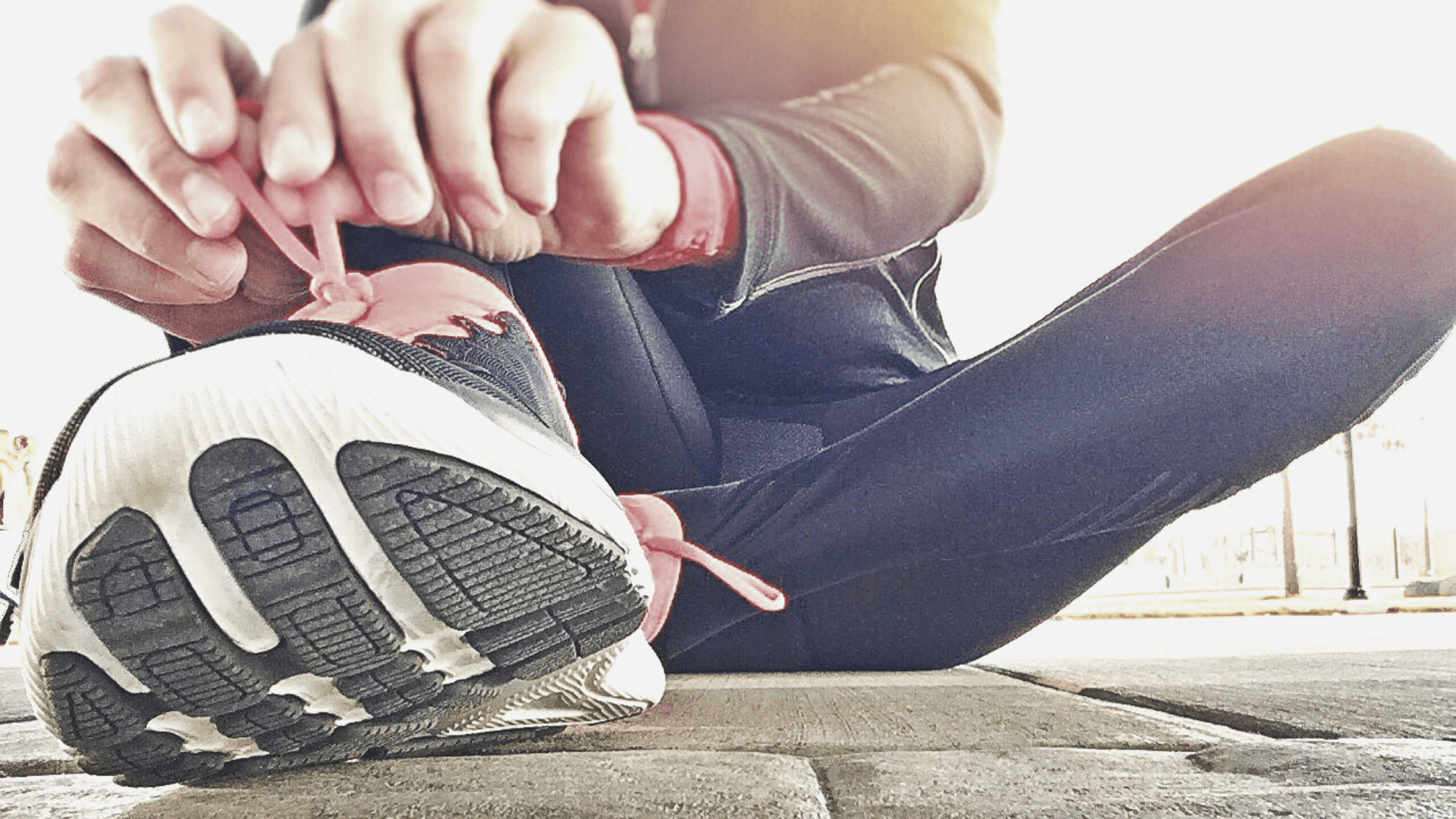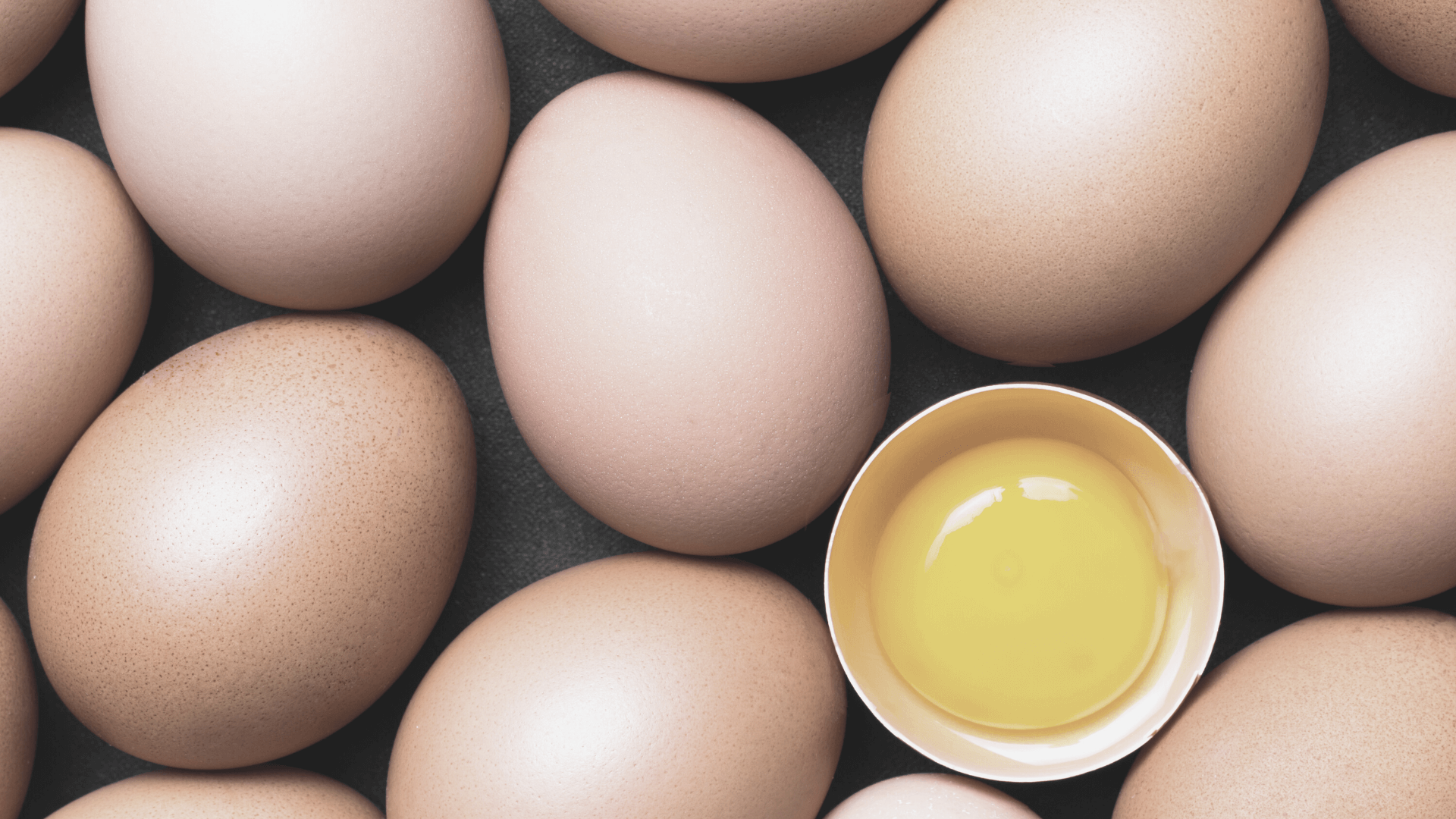Because there are hundreds (thousands?) of vitamins, minerals, herbs, etc., when it comes to answering the question, “When is the best time to take vitamins and supplements?” the answer is not always crystal clear.
This is because of all the different factors that make up each type of vitamin and/or supplement uniquely combined with your own, personal situation.
Therefore, I am a firm believer that when it comes to both medications and supplements, you must do the research for yourself and with your practitioner to understand the exact nuances of when, how, and even much of any and every single supplement you take.
However, my intention today is to give some basic guidelines for basic vitamins and supplements.
Fat-Soluble Vitamins vs Water-Soluble Vitamins
Before I break down more on timing, it’s important to start with a brief overview of fat soluble vitamins vs water soluble vitamins.
- Fat-soluble: easily stored in fat upon absorption
- Water-soluble: washed out and not easily stored and humans cannot store excess amounts of water-soluble vitamins for later use
Here is a list of each.
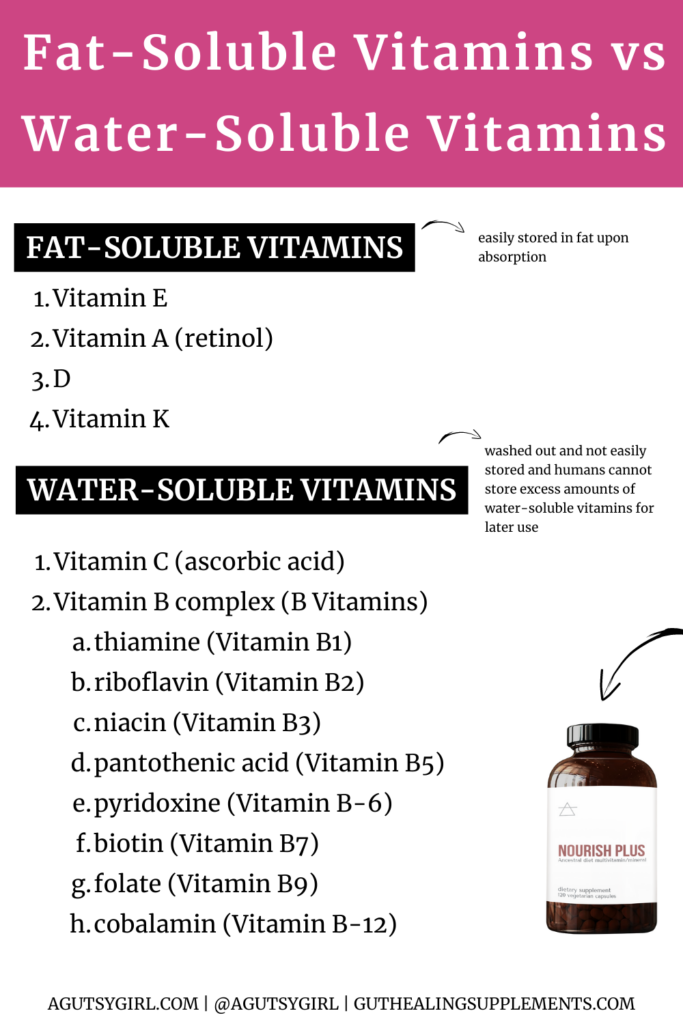
Fat-Soluble Vitamins
There are 4 fat-soluble vitamins:
- Vitamin E
- Vitamin A (retinol)
- D
- Vitamin K
And here are some things to know about them:
- They are absorbed into bloodstream or fatty tissues.
- Stored in fatty tissues or liver for later use.
- They are excreted slowly by our body.
- Excess accumulation can cause toxicity.
- Required more periodically; once per week or a few doses per month.
- Best to take with a fat-containing meal for maximum absorbption.
Water-Soluble Vitamins
There are 9 water-soluble vitamins. They include:
- Vitamin C (ascorbic acid)
- Vitamin B complex (B Vitamins)
- thiamine (Vitamin B1)
- riboflavin (Vitamin B2)
- niacin (Vitamin B3)
- pantothenic acid (Vitamin B5)
- pyridoxine (Vitamin B-6)
- biotin (Vitamin B7)
- folate (Vitamin B9)
- cobalamin (Vitamin B-12)
And here are some things to know about them:
- They are carried through the body’s tissues and absorbed directly in the bloodstream post-digestion.
- Not stored in the body, so they need to be replenished regularly.
- Any excess is eliminated through urine by the kidneys.
- Do not cause toxicity.
- Frequent intake is required; every 2-3 days.
Best Time to Take Vitamins and Supplements
Click HERE to save this post on the Best Time to Take Vitamins and Supplements for later.
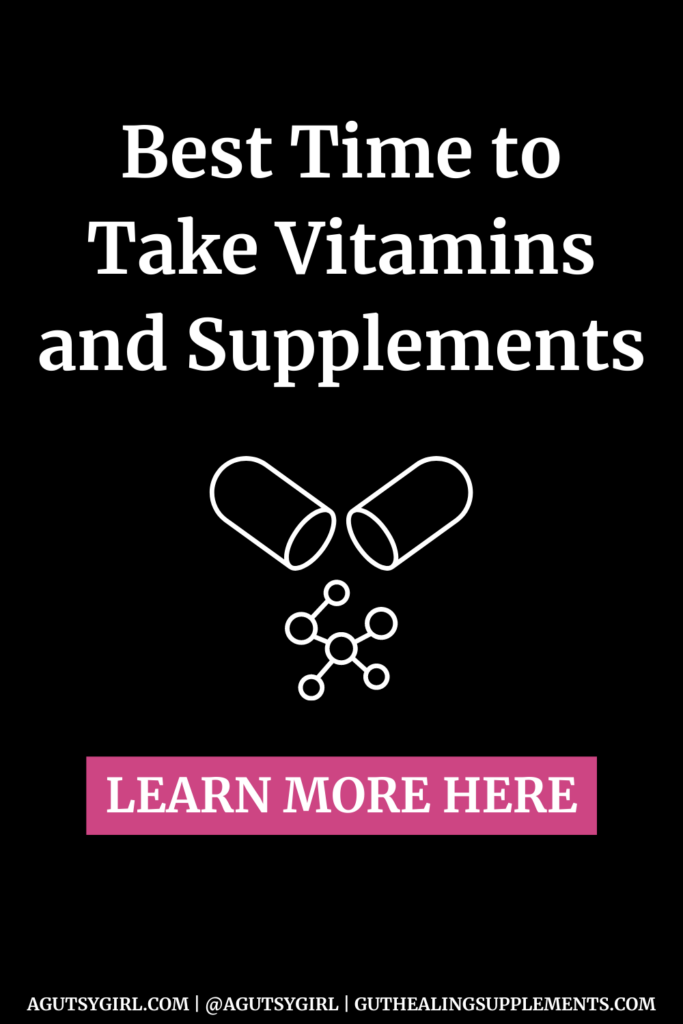
Okay, so now that we have the foundation for what both fat and water-soluble vitamins are, the question is, “WHEN to take them?”
Since a water-soluble vitamin means you need water to absorb them, these should be taken on an empty stomach with a glass of water.
And the fat-soluble vitamins should be taken after consumption of foods that contain fat.
The Gutsy community typically benefits from vitamins and supplements
According to the Cleveland Clinic, your doctor will oftentimes recommend vitamins and a daily supplement of sorts for these groups of people:
….those who have a chronic intestinal condition that causes malabsorption, including celiac disease, ulcerative colitis, Crohn’s disease and irritable bowel syndrome.
And the reason I share this is because, as it relates to vitamins, one very common supplement that’s recommended is a daily multivitamin.
However, taking multivitamin supplements is a little more murky when it comes to timing.
This is because multivitamins contain both water and fat-soluble vitamins.
So, then, when to actually take it?
The research varies, but the general thoughts include:
- best bet is to take them with a meal for optimal absorption
- typically best to take first thing in the morning, since any high-quality multivitamin includes vitamin B12 (which is energizing)
- be sure to drink water with it
As an example, I personally take Nourish Plus, a super high-quality multivitamin/multimineral and phytonutrient blend that provides the nutrients needed for optimal energy production. It’s made with food-based, bio-available ingredients the body can easily absorb.
Anyways, I personally take 2 in the morning with breakfast and then either 2 with lunch or dinner, depending on my overall energy levels and how I’m feeling. The time of day you personally take this multivitamin could be different, and the important thing is that you always check with your healthcare provider for any specifics.
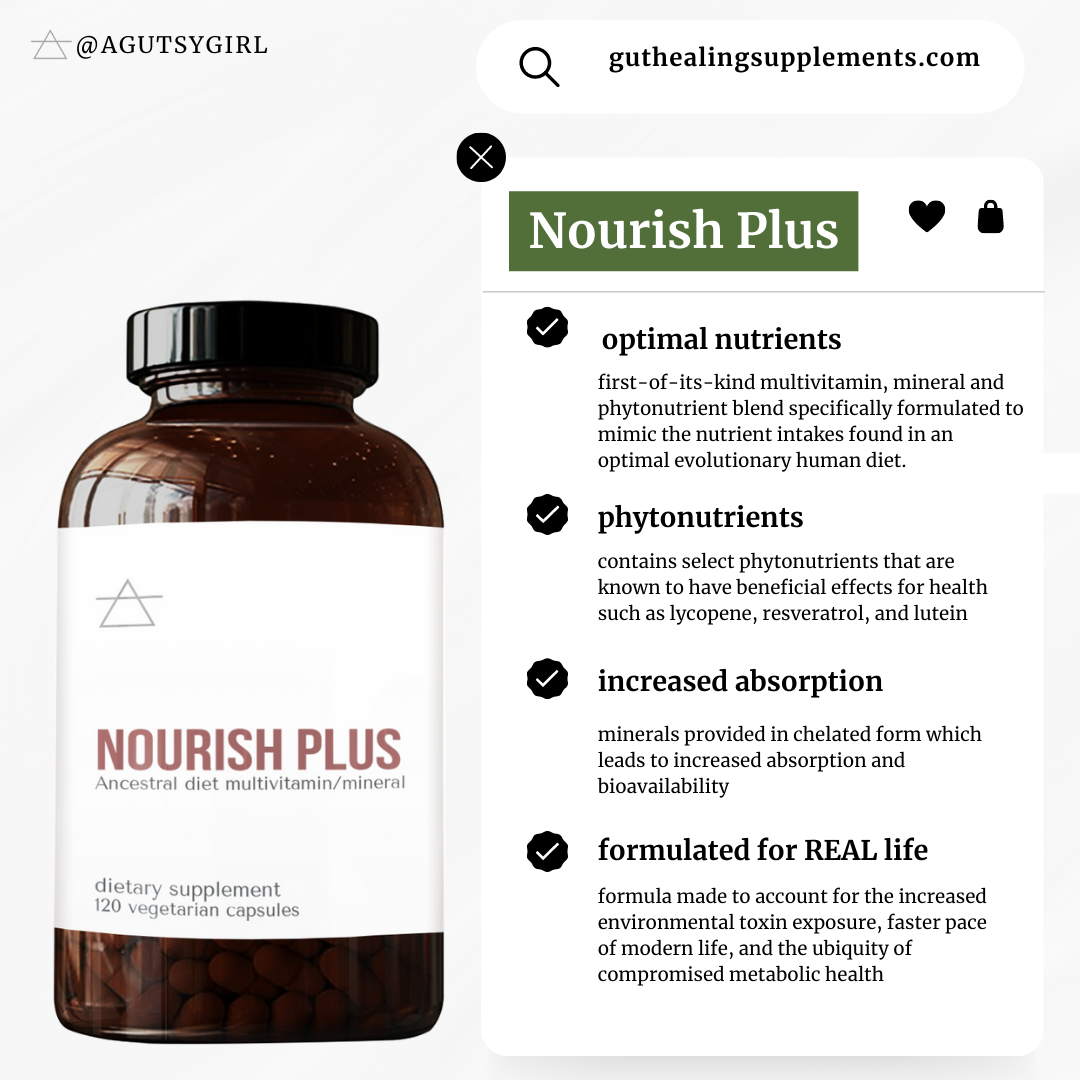
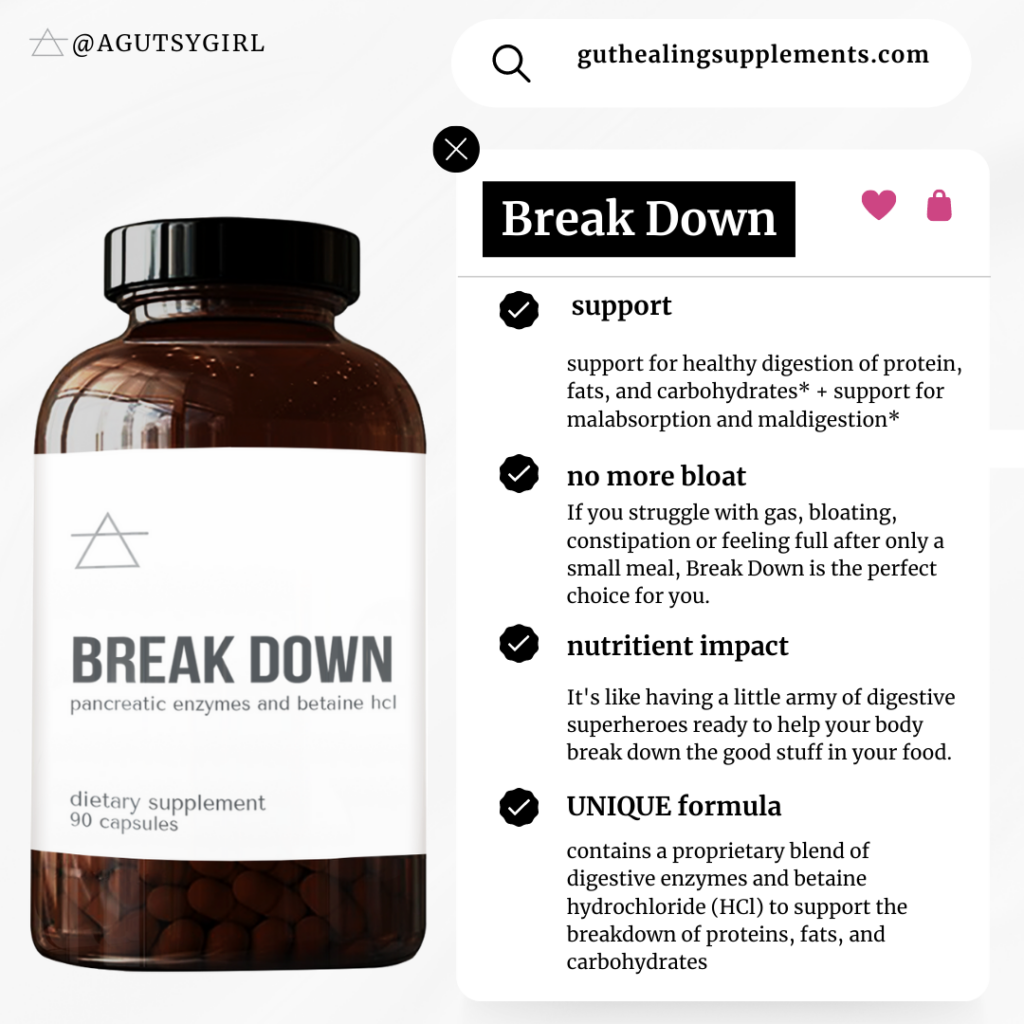
Other Dietary Supplements
Now, clearly, when it comes to the digestive system and having an extra boost of help, there are so many other supplements people consider and/or their health care provider recommends.
I’ll lay out some of the most common and share best practices for when to take these.
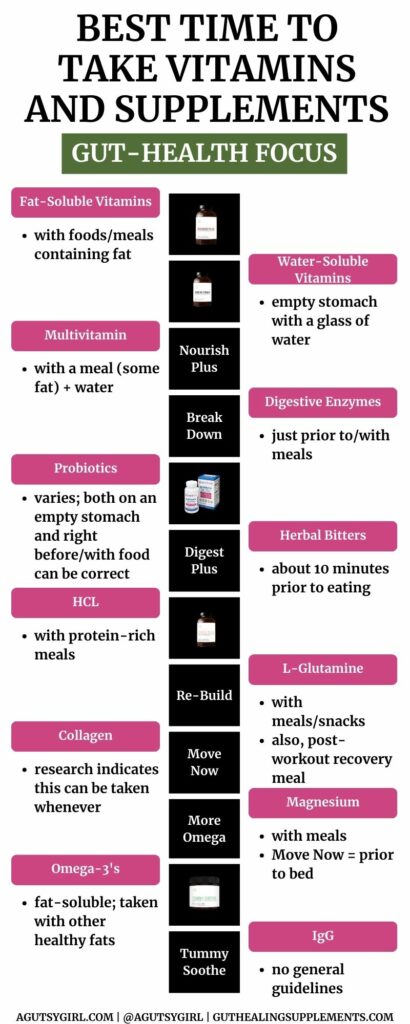
1. Digestive Enzymes
Digestive enzymes help turn larger molecules found in foods (carbs, protein and fats) into more easily absorbed particles (such as amino acids, fatty acids, cholesterol, simple sugars and nucleic acids).
We take them in the Gutsy community because so often a huge component to digestive issues is that we don’t have the proper enzymes to break down our food, thus causing symptoms like gas, bloating, and diarrhea.
When to Take Your Digestive Enzyme
Take your digestive enzyme supplement just prior to / with a meal. The goal is to utilize the enzymes for breaking down the food you are about to consume.
2. Probiotics
A probiotic is simply a mixture of live bacteria and/or yeast that lives in the body. Its goal is to help support beneficial bacteria.
When to Take Your Probiotic
You’re not likely to find a consistent answer.
There are two theories surrounding when the best time to take a probiotic is.
- EMPTY STOMACH Dr. Wallman claims on an empty stomach. “If you already have food in your stomach, your stomach becomes more acidic, likely killing off some of the specialized bacteria and limiting the ultimate number of CFUs that make it to their final destination.”
- RIGHT BEFORE/WITH FOOD However, I have written previously that on an empty stomach is a myth. An effective probiotic that successfully survives digestive juices will want to feed as soon as it arrives in the intestine, so the bacteria can immediately jump into action improving the microbiome. In that case taking your probiotic on a full, not empty, stomach would provide higher reproduction rates.
So which is right?
The answer depends on the probiotic you choose to take, likely.
However, if you have to take your probiotic on an empty stomach for survivability, then is it truly going to survive anyways?!
Food for thought.
Because I take the Just Thrive Probiotic, I know that it can survive anything. That said, I take mine typically in the morning, sprinkled in/on/over whatever I’m eating. (This means that I open the capsule, and pour its contents out.)
3. Herbal Bitters
A digestive bitter is an herb that supports digestive function by stimulating bitter receptors on the tongue, stomach, gallbladder and pancreas.
Their primary effect is to promote digestive juices such as stomach acid, bile and enzymes to breakdown food and assist in the absorption of nutrients.
Digestive bitters are believed to improve digestion by stimulating the Agni (digestive fire) and enhancing the secretion of digestive juices and enzymes.
When to Take Herbal Bitters
According to Parsley Health,
The ideal timeframe to take digestive bitters is right before a meal, or about 10 minutes before you start eating, according to Zellner. “Bitters can also be used after a meal, especially if you’ve eaten a little too much (Thanksgiving dinner, anyone?) or if you’re feeling bloated or gassy,” says Zellner.
Because herbal bitters helped me heal for good from SIBO, I still take them without skipping a beat to this day.
My digestive bitters, Digest Plus, also include a small amount of HCL and therefore, I take 2 before meals that also contain at least a little amount of protein. It’s important to make note of this with any HCL supplement.
4. HCL (Hydrochloric Acid)
According to my studies through the ADAPT program, here is the formal definition of HCL,
The stomach produces hydrochloric acid as part of the normal digestive process. The breakdown and absorption of nutrients occurs at an optimum rate only within a narrow range of acidity in the stomach. If there isn’t enough acid, the normal chemical reactions required to absorb nutrients are impaired. Hydrochloric acid is required for proper digestion of protein, carbohydrates, and fat, as well as efficient absorption of vitamins and minerals. Low stomach acid production can be caused by H. pylori infection (the bacterium that causes ulcers), stress, acid-suppressing drugs, a vegetarian or vegan diet, and advancing age.
While many in the Gutsy community believe they have too much stomach acid, more often than not it’s actually too little stomach acid, which could be the cause for so much bloat and discomfort.
And if you have too little stomach acid, it can be a good idea to supplement with HCL.
When to Take HCL
First and foremost, you need to know and be very clear and certain if you do or do not need to take it to help with digestion.
Work with your doctor on this (or do the at-home HCL challenge if you don’t fall into any of the categories below). Taking hydrochloric acid when you don’t need it is a huge mistake that could cause further damage to the GI lining and/or other adverse effects.
If you do need to take HCL, as mentioned above, you just must ensure you’re taking it with meals, and protein-rich meals in particular. If you take them without protein, you could definitely cause an upset stomach.
5. L-Glutamine
From my book A Gutsy Girl’s Bible,
Glutamine is an essential amino acid that is anti-inflammatory and necessary for the growth and repair of your intestinal lining. L-glutamine acts a protector and coats your cell walls, acting as a repellent to irritants.
Additionally,
Researchers are finding that it plays a critical role in healthy digestion and brain function.
When to Take L-Glutamine
According to the Mayo Clinic, it’s best to take L-Glutamine with meals or snacks. I take L-Glutamine in powder form, and thus, like the probiotic, collagen, and IGG, I add it right on/in/with meals for proper absorption.
Many people take L-Glutamine as part of their workout regimen, too, since it helps preserve muscle mass and increases muscle recovery. In this case, it can also be beneficial to take it with your post-workout meal.
6. Collagen
Collagen is a protein, meaning it is composed of many strains of different amino acids. It is the most abundant protein in the human body, which makes it a HUGE deal.
All of our connective tissue, such as our joints, cartilage, and even our blood contains collagen as a supporting structure.
Our body naturally builds collagen, but this production can decrease as we get older.
The structure of collagen fibers decays with age which can explain increased issues with joint pain and skin elasticity as we get older.
When to Take Collagen
The research varies as to the optimal time for collagen consumption for maximum benefits. But it does seem that, as a whole, all the experts in the field agree there’s no optimum time to take your supplement as long as you’re taking a high enough dose of collagen to see a difference, with most concurring that the minimum amount is 5g.
The collagen I personally use is my own from our line at guthealingsupplements.com. It’s called Re-Build and one scoop contains 12.5g of collagen benefits which has provided me with massive health benefits.
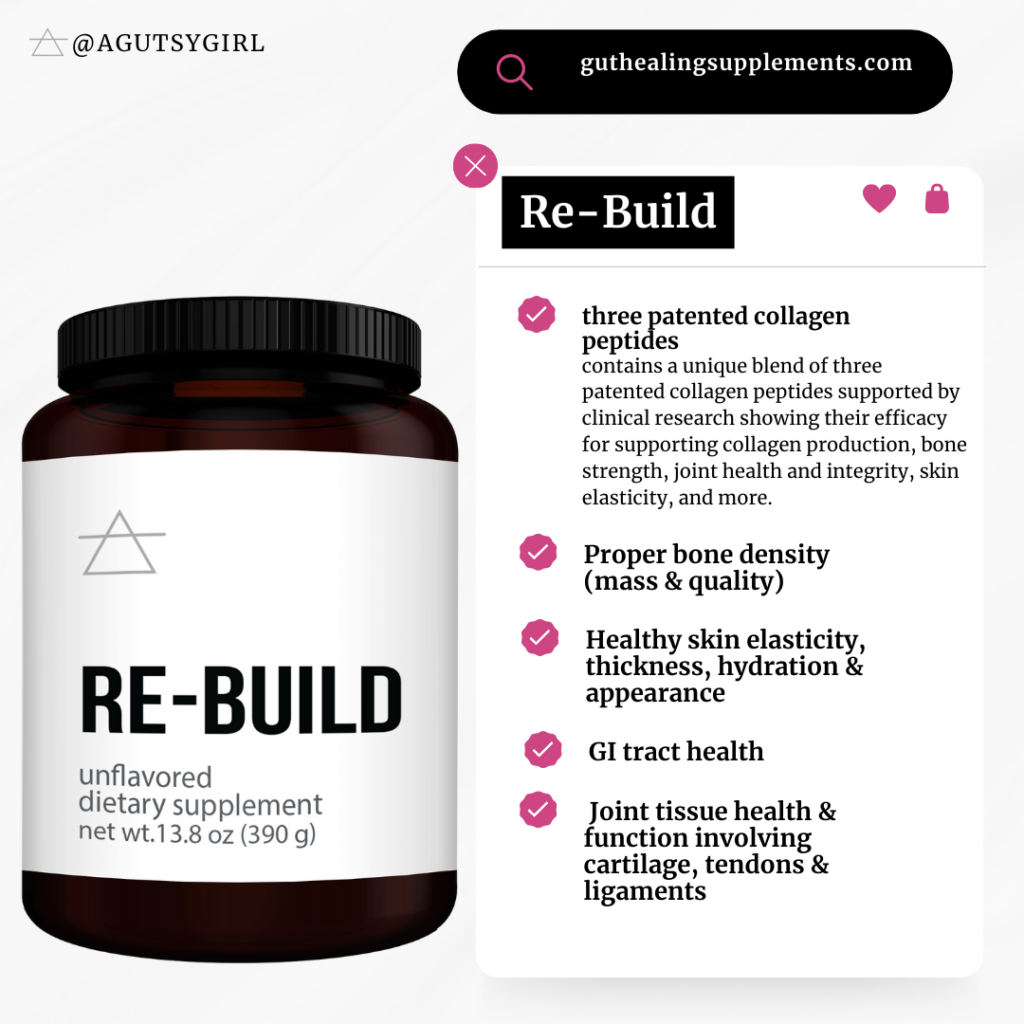
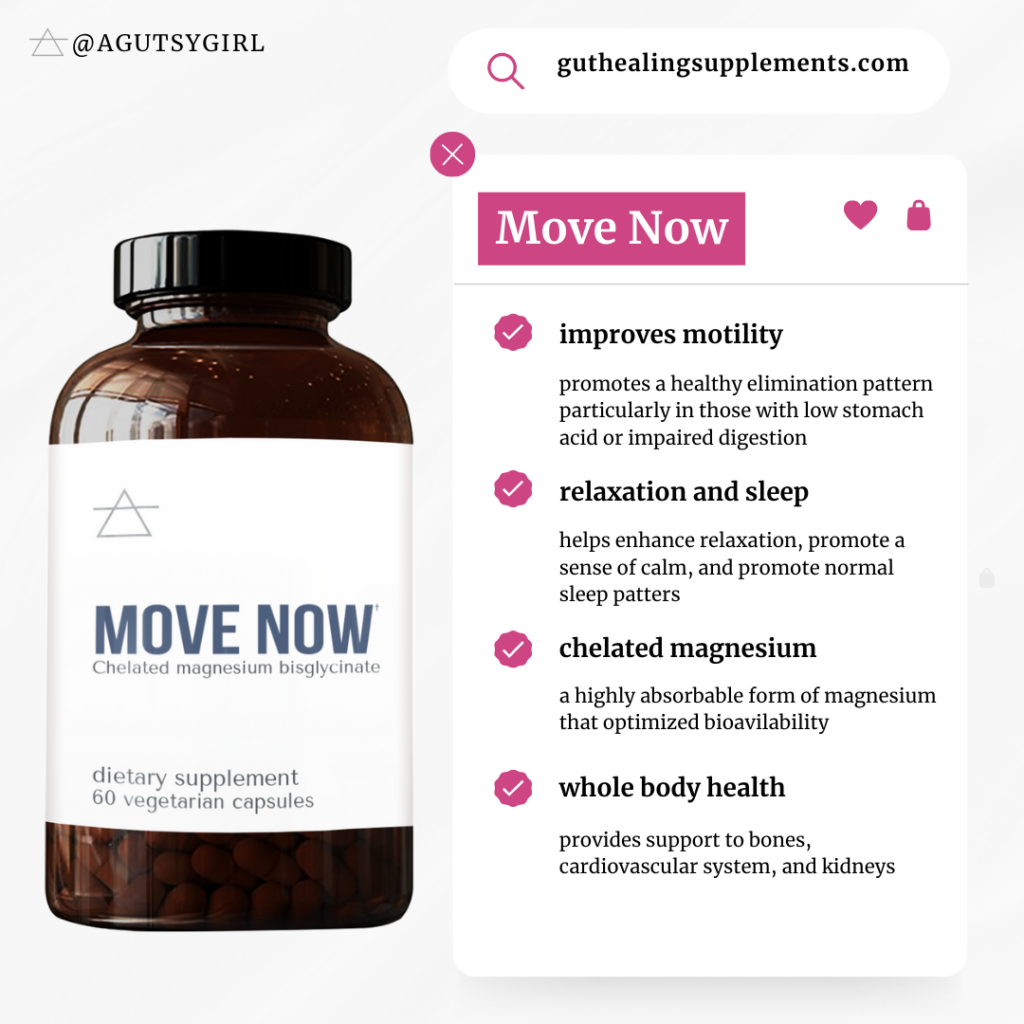
7. Magnesium
When it comes to magnesium, this supplement is a little more tricky from a timing standpoint. And that’s because there are many different types of magnesium.
Magnesium is a mineral which boasts the following:
- Fact: the body needs it to stay healthy.
- Regulates muscle and nerve function.
- Helps make protein, bone, and DNA.
- It is an essential mineral, and one of the seven essential macro-minerals.
- Supports energy production.
- Is the 2nd most abundant intracellular cation after potassium.
- Helps transport calcium, potassium, and other essential minerals.
- Protects metabolic health, which includes promoting better sleep.
- Magnesium is involved in over 600 enzymatic reactions including energy metabolism and protein synthesis.
- Functions as an electrolyte, maintaining fluid balance in your body.
- Increases GABA (Gamma Aminobutyric Acid, a naturally occurring amino acid that works as a neurotransmitter in your brain), which helps reduce stress and promotes more relaxation.
When to Take Magnesium
Mayo Clinic suggests, “Magnesium supplements should be taken with meals.” Now, for magnesium in the glycinate form, the best time of day to take this is at night because it helps promote sleep.
For example, I take Move Now with dinner at night.
8. Omega-3’s
Another common supplement in the Gutsy community is a high-quality omega-3 for overall inflammation reduction.
- Your body can’t produce the amount of omega-3s you need to survive. So, omega-3 fatty acids are essential nutrients, meaning you need to get them from the foods you eat.
- There are three main types of omega-3 fatty acids:
- EPA (eicosapentaenoic acid). EPA is a “marine omega-3” because it’s found in fish.
- DHA (docosahexaenoic acid). DHA is also a marine omega-3 found in fish.
- ALA (alpha-linolenic acid). ALA is the form of omega-3 found in plant foods.
When to Take Omega-3’s
Since this is a fat-soluble vitamin, the general consensus seems to be that it should be taken with other healthy fats in order to obtain maximum absorption. There aren’t general guidelines, however, as to when you must take it.
I take More Omega when I’m eating meals which contain foods like: olive oil, salmon, sardines, and walnuts.
9. IgG, namely ImmunoLin®
ImmunoLin® is the branded ingredient serum-derived bovine immunoglobulin/protein isolate (SBI).
In simpler terms, it is a protein-based (>90%) dietary supplement containing over 50% (w/w) immunoglobulins that helps support digestive function and a healthy mucosal immune system.
Research studies provide evidence that the diversity of immunoglobulins and proteins found in ImmunoLin® are safe and help improve digestive health and nutritional status by decreasing immune activation through mechanisms that involve antigen binding and strengthening gut barrier function.
When to Take IgG
There aren’t specific guidelines as to when it’s best to take IgG. For our own IgG, Tummy Soothe, it comes as a powder, so it can mix into anything. You can take it with or without food and almost no one experiences any type of negative side effects from it. IF you have an allergy to beef, though, this is not the supplement for you.
Sources: HERE, HERE, HERE, HERE, HERE, HERE, HERE
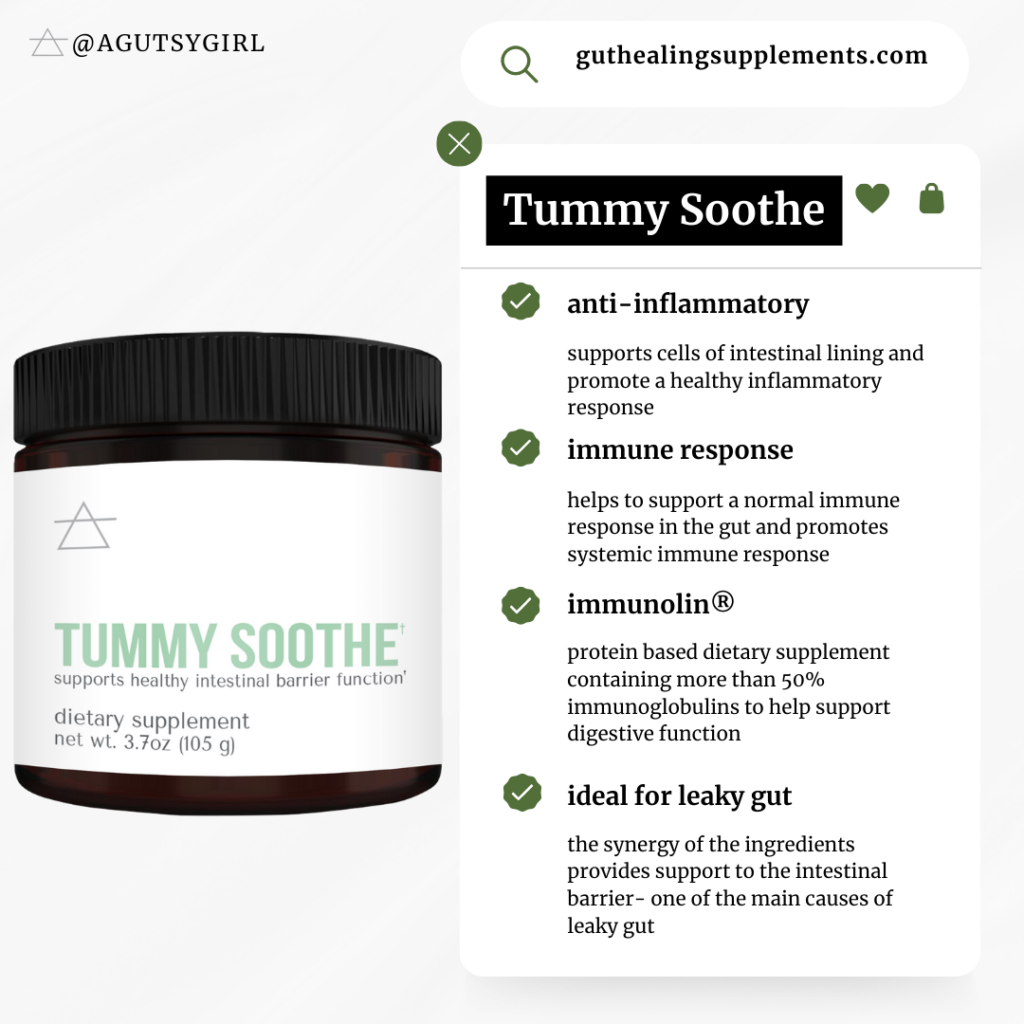
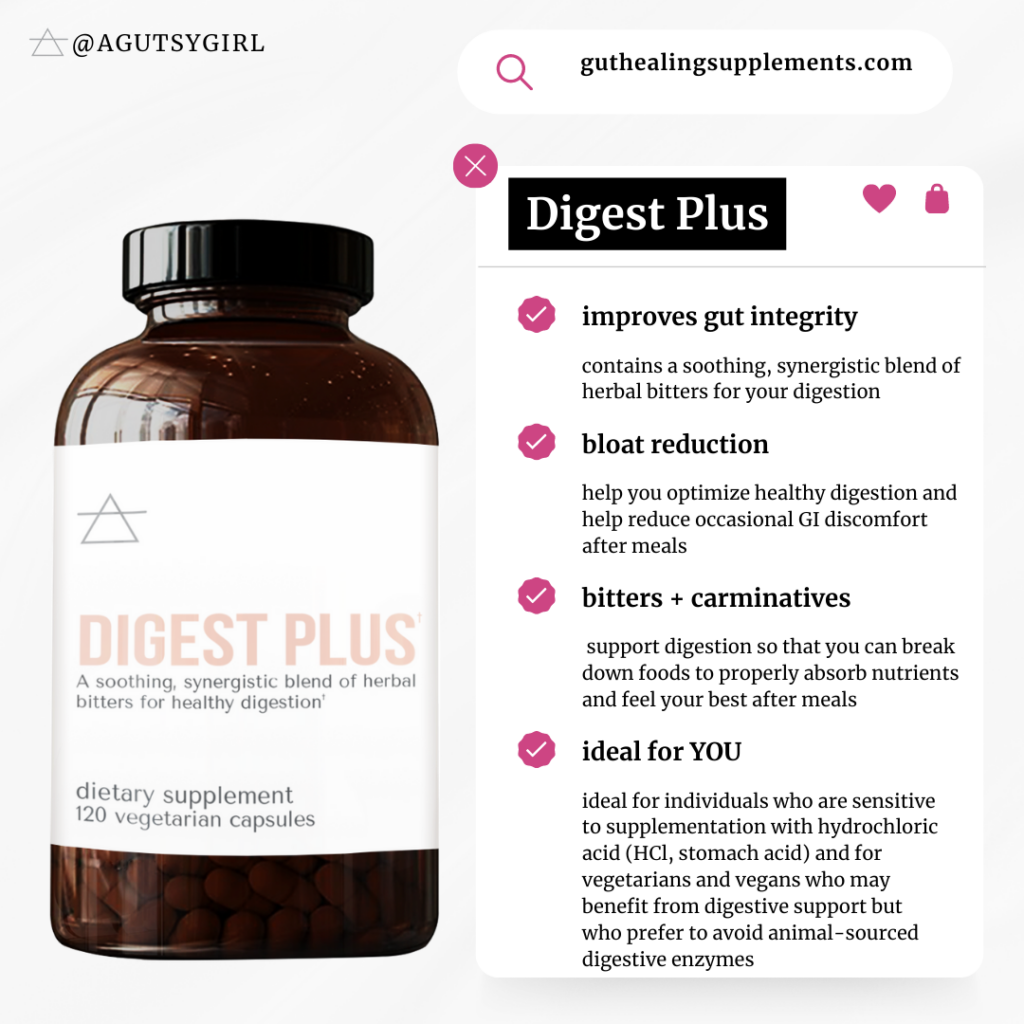
Balanced Diet
While I believe in the power of taking high-quality vitamins and supplements as part of the healing journey, I also I believe that full healing is not possible without a generalized healthy diet.
So often we forget the important role food plays for mitigating the risk of deficiency.
If your diet consists of whole foods then the need for high-doses of extra vitamins is far less.
The best way to achieve optimal gut health is by meeting nutritional needs and supplementing where the gaps are.
However, I will also say that many of the supplements on this list are less about covering nutritional gaps and more about HELPING WITH DIGESTION so that you can absorb your food better.
Those purposes are two different things that must be fully understood.
More Vitamins and Supplements?
Of course there are many other vitamins and supplements to consider, depending on your personal diagnosed medical conditions.
This is just the start with some common ones for Gutsy women.
If you want me to add any to this list, please comment below and I’ll add.
Finally, remember to always do your own research and ensure you’re getting the highest-quality supplements.
If you liked this post on the best time to take vitamins and supplements, you might also enjoy:
- Vitamin D Supplement
- A Gutsy Girl’s Supplement Line (everything you need to know)
- Why is My Stomach Upset?
Xox,
SKH
🤰 bloating be gone! weight loss through optimal gut health for women
💃ʜᴇᴀʟ ʏᴏᴜʀ ɢᴜᴛ. ʜᴇᴀʟ ʏᴏᴜʀ ʟɪfe.
🫶🏻 founder gutbyome.com

